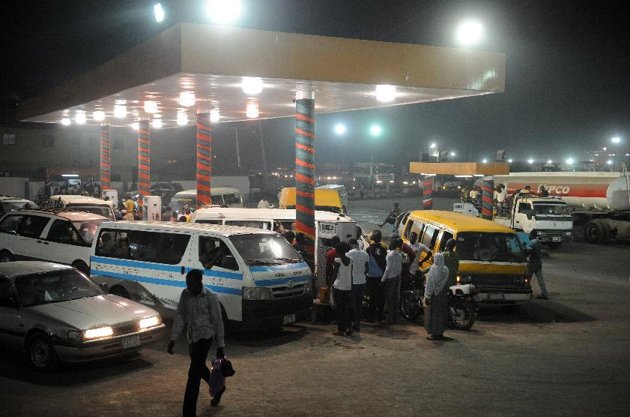
Nigerian unions ended a week-old nationwide strike Monday hours after the president climbed down on a petrol price hike, while security forces cracked down on holdout protestors.
The strike and mass protests over a sharp hike in fuel costs had shut down Africa's most populous nation and largest oil producer, putting intense pressure on the government as it also faced a wave of attacks blamed on Islamists.
As President Goodluck Jonathan's announcement to reduce petrol prices by about 30 percent was broadcast early Monday, soldiers occupied main protest sites and set up checkpoints in key areas.
They later fired tear gas and shot in the air to disperse demonstrators, while troops also drove armored vehicles toward protesters in the economic capital Lagos to disperse them. No one was reported hurt in the incidents.
Amid the tense atmosphere, secret police agents also stormed the CNN office in Lagos for unclear reasons, a witness said, asking questions about expatriate staff quotas and permission to operate, but left after about 20 minutes.
Union officials met about the situation in the morning and announced the suspension of the strike at around 1 pm.
"With the experiences of the past eight days, we are sure that no government or institution will take Nigerians for granted again," Nigeria Labour Congress chief Abdulwahed Omar said at a press conference.
"Labour and its allies formally announce the suspension of the strike, mass rallies and protests across the country."
He also said that the decision had been made "in order to save lives and in the interest of national survival."
Union officials said they remained in disagreement with the petrol price even after the decrease, but were ready to engage in further negotiations with government representatives.
The decision to halt the protests was by no means universally accepted. A number of groups that had been organizing demonstrations vowed to continue to do so, while police warned that street protesters would be arrested.
Police also said those calling for regime change of the democratically elected government would be charged with treason.
"This struggle is beyond the unions," said Joseph Obi, a 48-year-old businessman protesting in Lagos. "It appears labor leaders have sold out by calling off the strike."
Jonathan announced the price cut in a televised national address after a week that saw him remain largely silent in public as the strike and mass protests that began on 9 January shut down the country.
The president's announcement came after talks with unions had failed to resolve the dispute, with labor leaders demanding a return to pre-1 January petrol prices.
He charged that the protests had been "hijacked" by those seeking to promote "discord, anarchy and insecurity."
"Government will continue to pursue full deregulation of the downstream petroleum sector," Jonathan said in his address.
"However, given the hardships being suffered by Nigerians, and after due consideration and consultations with state governors and the leadership of the National Assembly, government has approved the reduction of the pump price of petrol to 97 naira [about 60 US cents] per liter."
The government had ended fuel subsidies on 1 January, causing petrol prices to more than double from 65 naira per liter to 140 naira or more.
Most in the country of some 160 million people live on less than US$2 a day, and Nigerians weary after years of blatant corruption view the subsidies as their only benefit from the nation's oil wealth.
Nigeria has also faced spiraling violence, most of it in the country's north and blamed on Islamist group Boko Haram, prompting warnings of a wider religious conflict and even the possibility of civil war.
But the main fuel protests had been largely peaceful, although at least 15 people are believed to have been killed in various incidents.
While the strike was suspended for the weekend, labor leaders had warned it would resume Monday if a deal had not been reached. An earlier threat to shut down oil production however had been put on hold.
Government officials and economists have said removing subsidies would allow much of the $8 billion a year in savings to be ploughed into projects to improve the country's woefully inadequate infrastructure.




